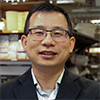Jianguo Mei

- Richard and Judith Wien Professor of Chemistry | Organic Chemistry, Materials Chemistry
- Email: jgmei@purdue.edu
- Phone: 47156
- Office: 465 WTHR
- Professor Jianguo Mei's individual homepage
Mei group's research activities are broadly defined. We are interested in the design and synthesis of organic semiconductors and conductors for printed electronics. Through molecular design, we tailor their optical, electronic, and mechanical properties for unmet needs. We strive to couple fundamental science with technology innovation to find materials and devices that can provide solutions for big societal challenges, such as energy, sustainability, and human health. Our research often involves the following components: Organic Synthesis is a key element in our research. We explore new synthetic approaches to prepare new organic materials. For instance, we recently reported a highly conductive n-doped transparent organic conductor (n-TOC) based on a highly efficient copper-catalyzed cascade reaction in the air. The performance of this n-TOC (n-PBDF) rivals indium-tin-oxide (ITO), commonly used in phone screens, displays, and solar cells. In other words, n-PBDF can be inside your phones in the future. Machine-learning Assisted High-throughput Automated Synthesis combines machine-learning algorithms with automated chemical synthesis to accelerate the discovery and development of new materials. The approach involves using large-scale, parallel chemical reactors to carry out chemical reactions in a high-throughput manner. Machine learning algorithms are then used to analyze the data generated by the high-throughput synthesis process, including information on reaction yield, purity, and other key metrics, to identify patterns and optimize reaction conditions in real time. By leveraging the power of machine learning, researchers can quickly screen a large number of potential reaction conditions, identify the most promising candidates, and rapidly iterate to optimize the synthesis of target compounds. The use of machine learning in high-throughput automated synthesis is used in the Mei group to accelerate the discovery and optimization of new materials with desired properties. Measurement science (analytical chemistry) is also a critical component in our research efforts. The essential goal is to establish the relationship among chemical structures-materials processing - thin-film morphologies - functional properties (e.g. mechanical, optical, and electronic properties). We have a wide range of instruments in house. Check here We also work on printed electronics such as electrochromic glass and bioelectronics. Smart windows is a type of electronic device that can change its light and heat transmission properties, which renders energy saving and bring users visual comfort. Organic Bio-electronics are a generic platform with unprecedented biological recording and regulation potentials - a technology that bridges biology with electronics. It is based on a unique combination of both electronic and ionic conductivity presented by conducting and semiconducting polymers that enables a means to effectively interface biology with conventional electronics. In our group, we design and synthesize such electronic and ionic polymers, integrate them into organic electrochemical transistors (OECTs), and use these devices to interrogate interesting biological processes such as neural activities, as well as disease diagnosis and monitoring. Our graduate and postdoc alumni have their careers in industries, academia, and government. For details, please check the people section . Education Ph.D., University of Florida, 2010 Postdoctoral Fellow, Stanford University, 2014 Awards 1. ACS Polymeric Materials: Science and Engineering (PMSE) Young Investigator, 2020 2. ACS Division of Organic Chemistry (DOC) Academic Young Investigator, 2019 3. Teaching for Tomorrow, 2017 4. NSF Career Award, 2017 5. ACS PRF Doctoral New Investigator, 2017 6. Office of Naval Research Young Investigator Award (ONR YIP), 2016 7. Procter & Gamble Research Award, University of Florida, 2009 8. Butler Polymer Research Award, University of Florida, 2009